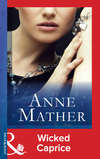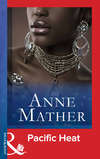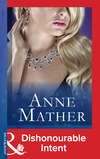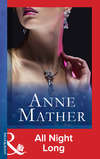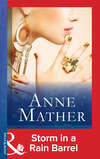Loe raamatut: «Wicked Caprice»
Mills & Boon is proud to present a fabulous collection of fantastic novels by bestselling, much loved author
ANNE MATHER
Anne has a stellar record of achievement within the publishing industry, having written over one hundred and sixty books, with worldwide sales of more than forty-eight MILLION copies in multiple languages.
This amazing collection of classic stories offers a chance for readers to recapture the pleasure Anne’s powerful, passionate writing has given.
We are sure you will love them all!
I’ve always wanted to write—which is not to say I’ve always wanted to be a professional writer. On the contrary, for years I only wrote for my own pleasure and it wasn’t until my husband suggested sending one of my stories to a publisher that we put several publishers’ names into a hat and pulled one out. The rest, as they say, is history. And now, one hundred and sixty-two books later, I’m literally—excuse the pun—staggered by what’s happened.
I had written all through my infant and junior years and on into my teens, the stories changing from children’s adventures to torrid gypsy passions. My mother used to gather these manuscripts up from time to time, when my bedroom became too untidy, and dispose of them! In those days, I used not to finish any of the stories and Caroline, my first published novel, was the first I’d ever completed. I was newly married then and my daughter was just a baby, and it was quite a job juggling my household chores and scribbling away in exercise books every chance I got. Not very professional, as you can imagine, but that’s the way it was.
These days, I have a bit more time to devote to my work, but that first love of writing has never changed. I can’t imagine not having a current book on the typewriter—yes, it’s my husband who transcribes everything on to the computer. He’s my partner in both life and work and I depend on his good sense more than I care to admit.
We have two grown-up children, a son and a daughter, and two almost grown-up grandchildren, Abi and Ben. My e-mail address is mystic-am@msn.com and I’d be happy to hear from any of my wonderful readers.
Wicked Caprice
Anne Mather

Table of Contents
Cover About the Author Title Page CHAPTER ONE CHAPTER TWO CHAPTER THREE CHAPTER FOUR CHAPTER FIVE CHAPTER SIX CHAPTER SEVEN CHAPTER EIGHT CHAPTER NINE CHAPTER TEN CHAPTER ELEVEN CHAPTER TWELVE CHAPTER THIRTEEN CHAPTER FOURTEEN CHAPTER FIFTEEN CHAPTER SIXTEEN CHAPTER SEVENTEEN CHAPTER EIGHTEEN CHAPTER NINETEEN CHAPTER TWENTY Copyright
CHAPTER ONE
SHE didn’t look like the kind of woman he had expected.
Julian’s description of her had been fairly explicit, and it was hard to match up her portrayal of a vicious, self-seeking seductress with the slim, pale creature facing him across the counter.
‘Can I help you?’
Her voice was attractive, certainly, low and slightly throaty, and probably inclined to a breathless huskiness when her sexual needs were being met. Was she the kind of woman who just moaned her pleasure, or did she whisper erotic words of approval in Richard’s ear? Either way, it was hard to imagine his brother-in-law being interested in such a colourless female. In the past, his tastes had run in an entirely different direction.
‘Hmm...? Oh, yes.’
Patrick glanced quickly about him, realising that apart from himself the shop was empty. He had spent so long studying her appearance that the other customers had all been dealt with, and her question caught him unawares, his mind empty of the reason why he’d purportedly come into the shop.
‘Shells,’ he said hastily as the excuse he’d adopted to enter the establishment popped back into his mind. He’d seen a necklace of shells in the window and it had seemed a suitable item to select.
‘Shells?’ she echoed pleasantly. ‘You’re a collector of shells? Do you mean shells that have just been polished and are otherwise in their natural state? Or perhaps you like these abstract collages? They’ve proved very popular, actually.’
The square frame she had selected from the display behind the counter made Patrick cringe. The childish daubings of paint on shells, whose haphazard arrangement on a wooden backing looked more abstracted than abstract, appalled him, and he couldn’t imagine anyone finding its composition attractive.
‘Um...it was a necklace, actually,’ he said, casting a doubtful glance over his shoulder. ‘In the window. I thought it might suit my niece.’
Though he could never give it to her, he reflected ruefully. He could picture Jillian’s outrage if he turned up with a necklace bought from that woman’s shop. No matter that Susie might like it. Even considering doing such a thing would constitute a betrayal of the highest order in his sister’s eyes. Besides, there was always the possibility that Richard might recognise it, and Jillian would prefer her husband not to know she’d interfered.
‘Oh, yes. I know the one.’
With a smile, she came out from behind the counter and crossed the sales area to approach the window he’d indicated. As she passed, Patrick was assailed by the delicate aroma of her perfume, an odour that mingled what he thought might be lily of the valley and rosewater with the feminine warmth of her body.
He was also made aware of the fact that she moved with a distinctive grace for such a tall young woman, her hips swaying rhythmically as she strode across the floor, her full skirt swishing softly about her ankles. Her hair was plaited, a thick, glossy, toffee-coloured braid that bobbed about between her shoulderblades. It was almost the exact same colour as her eyes, he mused reluctantly, though her brows were darker, her lashes thick and straight.
She was also wearing boots, he saw as she bent to remove the necklace from the window—thick-soled boots, which Patrick would have considered more suitable for going hiking. Or perhaps mountaineering, he amended drily. Whatever else Richard had seen in her, he couldn’t have been attracted by the way she dressed.
‘Here we are,’ she said, straightening, and Patrick dragged his eyes away from the provocative cleft that had been revealed when she’d bent over. For all his dismissal of her charms, he had to admit there was something about her. Despite the shapeless clothes, she did possess a sensuality that wasn’t immediately apparent.
‘Thanks.’
He took the necklace from her, and was surprised by the jolt of awareness he felt when her slim hand brushed his. Concentrating his attention on the necklace, he couldn’t help wondering if she’d felt it too, though when he permitted himself a quick glance through his lashes she appeared to be as cool and composed as before.
‘It’s the last one,’ she said, and for a moment he couldn’t for the hell of him think what she was talking about.
‘The last...?’
‘Yes, the last necklace,’ she clarified smoothly. ‘I think people have mostly bought them for children. As you can see, the string isn’t very long.’
‘Yes.’
Patrick felt curiously perplexed. He was used to being in control of most situations, but for a moment there he had felt at a distinct disadvantage. It was the unfamiliarity of his surroundings, he told himself, and of this young woman, who seemed to bear little resemblance to the promiscuous hussy his sister had described. She could be everything Jillian had accused her of being—God knew, appearances were often deceptive—but had Richard succumbed to her wiles, or had she succumbed to his?
‘Do you like it?’
Once again, her question aroused a most unsuitable response inside him, and he felt a faintly amused impatience with himself for allowing his instincts to govern his head. For God’s sake, the woman wasn’t even pretty, and in those clothes she wouldn’t attract a second glance. Yet, for some strange reason, he was aware of her, in a way he hadn’t been aware of a woman for years.
If ever..
‘It’s pretty,’ he said now, the word springing obviously to mind, and she nodded in agreement.
‘I think so,’ she agreed. ‘These fan-shaped shells are so delicate. I love that shade of pink. It would be impossible to produce it artificially.’
‘Mmm.’
Patrick was noncommittal, aware that by admiring the necklace he was making it doubly hard to reject it later. After all, he hadn’t come here to admire the merchandise; he was supposed to be finding out what she wanted from Richard. In Jillian’s opinion, she had to have a price. Richard’s women always did.
‘You don’t like it?’
His doubts, albeit of a different nature, had communicated themselves to her, and she tilted her head to look up at him. Immediately, he was aware of the purity of her profile, of the cheekbones that gave her face such a good basic structure, and the mouth, which had parted slightly in enquiry.
He wanted to taste that mouth, he realised in a horrifying revelation. He wanted to crush it, and shape it with his tongue, and suck the full lower lip into his mouth. He wanted to see if she tasted as good as she smelled, and if that delicate pink tongue, presently trapped between two rows of white teeth, was as moist and juicy as it appeared...
He drew a steadying breath. For God’s sake, he chided himself as his trousers felt uncomfortably tight all of a sudden. What the hell was the matter with him? He hadn’t realised he was so desperately in need of sex.
Assuming an interest in a colourful display of quilts, he succeeded in putting some space between them. ‘It’s not that,’ he said, realising he hadn’t answered her question. ‘I just don’t know if Susie...if she would like it.’
‘Susie?’ She’d latched onto the word, and he cursed himself for using his niece’s name so thoughtlessly. ‘A colleague of mine’s daughter is called Susie too. It’s a nice name, isn’t it? Is it short for Susannah?’
‘No.’ It was, but he wasn’t going to admit it. ‘Um... it’s just Susie, actually. Not an abbreviation. Her... parents chose it. Her grandmother’s name is the same.’
‘I see.’
He wondered if she did. He hoped not. Nevertheless, he had gone over the top with the explanations, and if he’d regretted using Susie’s name before he felt doubly impatient with himself now.
Something had to be done to divert the conversation, and, smoothing the fabric of one of the quilts between his thumb and forefinger, he cast what he hoped was a casual glance over his shoulder. ‘Is this what you call patchwork?’
‘That’s right.’ His enquiry had achieved what he least wanted; it had brought her after him, and he was intensely aware of her now, hovering at his elbow. ‘Actually, they’re made by an old lady who’s almost crippled with arthritis. But her needlework is exquisite, don’t you agree?’
As Patrick had no idea what was required to make one of the padded spreads, he merely nodded his approval, and moved on to a table piled with soft toys. At least here he could be more knowledgeable; the stuffed menagerie was obviously attractive, the prices mirroring the small-shop status, yet in no way diminishing the toys’ appeal.
‘They’re handmade too,’ she murmured as Patrick admired a pair of rabbits. ‘In fact, everything we sell is handcrafted. We provide an outlet for people who wouldn’t otherwise have anywhere to sell their goods.’
Jillian hadn’t told him that. But then, why would she? She wasn’t interested in the aims of the business, just in its proprietor... or was that proprietrix? Anyway, just because this young woman was doing her bit to help the independent producer it didn’t make the situation any more acceptable. She might be regarded as a saint by her suppliers and still live an execrable private life.
‘Has the shop been open long, Miss—Miss—?’ He stopped, as if he didn’t already know her name by rote.
‘Herriot,’ she inserted quickly. ‘Isobel Herriot. And I opened the shop almost five years ago.’ She paused. ‘Why?’
‘Just curious,’ he answered smoothly, a smile erasing any suspicion. ‘You’ve got quite a choice of items. I wondered how you managed to sustain your stock.’
‘Oh...’She shrugged her slim shoulders, and against his will his eyes were drawn to her chest. For such a slim young woman she had rather full breasts, and the way they moved beneath the gauze shirt she was wearing made him wonder if she wore a bra. ‘It was a struggle to begin with. But we’re getting there now, I think.’
So was he, thought Patrick irritably, wishing he had never agreed to come here. Dammit, the girl was screwing his brother-in-law, and he was acting as if that circumstance turned him on. It didn’t. He despised Richard and he despised her for putting his sister’s marriage in jeopardy. Not to mention risking their children’s happiness. Ten-year-old Susie and her brother Nigel, who was six, didn’t deserve to be treated as if their lives were of no account.
His eyes hardened. ‘Do you own the shop, Miss Herriot?’ he enquired, keeping his tone neutral, and she gave a rueful sigh.
‘In such a prime position?’ She grimaced. ‘Chance would be a fine thing. No, my new landlord is the colleague I was telling you about. The one who has a daughter called Susie—Susannah.’
‘Ah.’
Patrick acted as if he didn’t already know that Shannon Holdings had recently acquired the lease on the row of small businesses that fronted this side of the high street in Horsham-on-the-Water. Situated almost midway between Stratford-on-Avon and Stow-on-the-Wold, the little Cotswold village of Horsham attracted a lot of passing trade. But it was also true that many people came to Horsham for its own sake, visiting the old Norman church, and the monastery, where a delicious foaming mead had been made for more years than anyone could remember.
‘Of course,’ she went on, almost absently, ‘there’s going to be an increase in the rents. Old Mrs Foxworth, who used to own the Foxworth estate, let the tenants rent these properties for a pittance, so long as the buildings were kept in good repair. It was a kind of noblesse oblige, I suppose, and we’d all begun to think it would go on indefinitely. But the people who’ve bought the estate—some London company, I believe—obviously won’t feel so charitable. How could they? They don’t know us. Richard says he’ll do his best to put our case forward, but we don’t hold out much hope.’
Patrick endeavoured not to show his true feelings. ‘Richard?’ he echoed politely. He bit into the inner flesh of his lower lip. ‘Your new landlord—I remember.’
‘Well, he isn’t exactly our new landlord,’ she explained, and the faintly terse edge to her tone seemed to indicate that she had realised she was discussing private matters with a stranger. ‘Rich—Mr Gregory, that is—is just an employee of the company.’ Her nostrils flared in sudden impatience. ‘And I don’t see what he or anyone else can do.’
Patrick found himself resenting the way Richard had represented himself to her, but that was the least of his troubles. How well did she know his brother-in-law? And what exactly had Richard promised to do?
Choosing his words with care, Patrick laid the shell necklace on the counter. ‘You sound as if you have a champion, at least,’ he remarked guardedly. ‘Have you known this Mr—ah—Gregory long?’
‘Not long.’ Her tone was clipped now, and he was very much afraid he’d overplayed his hand. She lifted the necklace, cradling it in fingers that were long and vaguely artistic. ‘Have you made a decision?’
Patrick blinked. ‘Oh—about the necklace,’ he said, aware that she was looking at him a little warily now. ‘Um—yes. Yes, I’ll have it.’ He examined the price tag and pulled out his wallet. ‘Perhaps you could wrap it for me. I’ll be back this way in a couple of days and I’ll collect it then.’
‘I can wrap it now,’ she said, and he was racking his brains for a suitable excuse for her not to do so when a group of elderly American tourists entered the shop.
‘Thursday,’ he said, throwing a couple of notes onto the counter. ‘I can see you’re going to be busy, and I can wait.’
With the door closed behind him, Patrick breathed a little easier, though why he should imagine that by returning to the shop two days hence he might learn any more about her relationship with Richard he didn’t know. He could hardly come right out and ask her, even if that was what Jillian would have him do. But then, Jillian wanted him to threaten the girl with God knew what kind of retribution if she continued to have an affair with her husband, and she was aware of the kind of leverage he could bring to bear if Isobel Herriot refused to do as he said.
His car was parked further along the high street, and, opening the rear door, Patrick slid into the back of the Bentley with some relief. ‘Let’s go, Joe,’ he said, when the impassive Muzambe turned to give him a questioning glance. ‘Portland Street first, and then home.’
Joe Muzambe put the big car into gear, switched on the indicator, and pulled out into a gap in the stream of traffic passing through the village. ‘You don’t want to stop at Mrs Gregory’s?’ he asked, with the familiarity of long service, and Patrick, dragging a file of papers from his briefcase, gave him a retiring look.
‘No, I do not,’ he replied, aware that the chauffeur was referring to the fact that they’d pass within a couple of miles of Jillian’s house on their way back to town. ‘I don’t have anything to tell her,’ he added, with an irritation that was directed as much at himself as at his sister. ‘Now, if you don’t mind, can we get going? I want to do some work.’
CHAPTER TWO
‘BUT who was he?’
Christine Nelson perched on the edge of the counter and regarded her friend and employer with impatient eyes. There were times when Isobel’s other-worldliness really bugged her, and her lack of interest in the dishy male Christine had seen coming out of the craft shop was positively infuriating.
‘I’ve told you, I don’t know,’ replied Isobel, examining the figures in the cash book which she was trying to balance with the contents of the till. ‘He didn’t say, and I could hardly ask him. It’s not as if it matters, after all.’
‘Of course it matters.’ Christine was frustrated. ‘Do you want to live in this old backwater all your life? For heaven’s sake, you should have seen the car he got into. If it wasn’t a Rolls-Royce, I’ll—’
‘Chris, please!’
Isobel was finding it increasingly difficult to concentrate with her young assistant prattling on about a man they were unlikely to see again. For all he’d paid for the necklace, and for all he’d said he’d be back, Isobel was chary. She had the feeling he’d been looking for something she didn’t sell.
But what?
‘Well...’ Christine wasn’t daunted ‘...it’s time you realised you’re not getting any younger. The old body clock is ticking, Issy. And you are almost thirty. I wouldn’t be so blasé, if I were you.’
‘But you’re not me, are you?’ retorted Isobel, stung into her own defence. ‘And I’m not a seventeen-year-old girl who still believes in fairy stories. If he is as—as good-looking as you think, and rich enough to drive a Rolls-Royce, he’s not going to be interested in me, is he—an ageing spinster, with a mid-life crisis?’
‘Now you’re exaggerating,’ declared Christine, getting down from the counter and scuffing her toe against the worn vinyl flooring. ‘Just because I mentioned your age doesn’t mean I think you’re middle-aged. But you have to admit you’re not getting any younger, and, knowing how you dote on those children of your brother’s, I’d have thought you’d like a baby of your own.’
Isobel pressed her lips together. She was tempted to make some scathing retort, but she knew that anything she said could be misconstrued as sour grapes. Nevertheless, she resented Christine’s assumption that all women must necessarily want to get married. She wasn’t at all sure that that was an option she wanted to consider. She was quite happy being her own mistress, and although she didn’t dislike men she’d never felt the slightest inclination to submit her will to that of some nebulous male.
Until today...
But that was ridiculous, and she knew it. As she secured the roll of notes with an elastic band and added them to the jingling coins already in the leather bag she used to carry the money to and from the bank, she acknowledged that Christine would have a field-day if she knew what her employer was really thinking. Because, far from being able to dismiss the attractive stranger from her mind, Isobel had hardly known a moment’s peace since he had departed. To say that he had disturbed her was a vast understatement; it would be more accurate to compare an earthquake to the minor tremors they had felt in Wales.
‘You would like to get married, wouldn’t you?’ Christine persisted, and Isobel wondered how they’d ever got onto this topic. A schoolfriend of Christine’s had recently found herself pregnant and was having to get married, and since then Chris had become decidedly broody. Her own parents had produced seven children, and, since she was the daughter of a local farmer, she was well-versed in animal husbandry.
‘I don’t know,’ Isobel answered now, collecting her cardigan from the room at the back of the shop. ‘If you’re finished, can we get going? I want to go to Stoddart’s before they close.’
Christine had no choice but to precede her employer out of the shop, and Isobel set the alarm and then joined her. As she locked the door she couldn’t help casting a faintly apprehensive look about her. But there was no sign of her intriguing visitor, or the expensive car that Christine had said he drove.
Leaving the younger girl to go her own way, Isobel went to the bank first, stowing the day’s takings in the night safe before turning back to the local supermarket. She felt in need of some extra sustenance, and she put a bottle of white wine into her basket. At least she could afford to live reasonably comfortably, she reflected. Her grandmother’s legacy had enabled her to do that.
But as she walked home, exchanging greetings with many of the other shopkeepers who were closing up for the night, she couldn’t help wondering if that was why she hadn’t got married before now. Being independent had its advantages, but it also made one more inclined to think things out. Her usual criterion, when some man began to show too close an interest in her, was to ask herself what she had to gain from the liaison. If the answer was nothing, as it invariably was, she ended the relationship. In consequence, she had remained detached from any emotional entanglements.
Her own parents were hardly a good example of married bliss. Although she was sure they cared about one another, they each lived their own lives. Her mother ran a fairly successful interior decorating business in Stratford, and her father was the local doctor, and therefore absorbed in his work. Isobel was their only daughter, but they had never put any pressure on her. She supposed they would appreciate a couple more grandchildren one day, but her brother’s three seemed more than enough to be going on with.
Isobel’s cottage was situated off the high street, in a narrow lane that backed onto the church. It was another of the advantages that her grandmother’s legacy had given her. Until her grandmother died, she had been living and working in London.
Of course, she had been a part of the so-called rat race in those days. Leaving university with a double first in art and history, she had joined a well-known firm of auctioneers, with a view to becoming one of their in-house experts. The salary had been excellent and the work interesting, but the kind of social life she had been expected to enjoy had made her realise she was not really cut out for such political manoeuvring. She was basically a country girl who found life in the city rather shallow and specious. She was happiest with people who were not desperate to further their ambitions, and to whom an invitation to supper possessed no hidden agenda.
The crunch had come when her immediate superior had been dismissed because, according to her boss, she couldn’t handle it. It had not been until Isobel, promoted in her place, had discovered what the ‘it’ was that he had been talking about that she had given in her notice. The fact that her grandmother had just died had seemed just an unhappy coincidence until the solicitor had informed her of the legacy the old lady had left her. With it she had been able to buy the cottage, and take her time looking around for an alternative occupation.
The idea of opening the craft shop had been an inspiration, and it had been amazing how quickly the advertisement she had placed in the local newspaper had borne fruit. Until then, the many amateur craftsmen and women in the area had not had a shop window in which to display their wares. They’d been obliged to offer their work at fairs and jumble sales, often accepting less than the articles were worth to obtain a sale. With the opening of Caprice, they had their opportunity, and Isobel was always amazed at how the standard of the merchandise she was offered just went up and up.
The past five years had been the happiest of her life, and it was only the vague apprehension she was feeling about the coming increase in the rent for the shop that was looming like a cloud on the horizon now. It depended how much it was, of course, but it wouldn’t be easy absorbing the increase without putting up the cost of the goods she sold, and while she had great faith in the quality of the workmanship people often wanted designer names these days.
Still, she reflected, opening her front door and stepping into the cool, scented shadows of her hallway, Richard had promised to do his best to limit the increase. If he could persuade his employers not to be too greedy, he would, and the shopkeepers had little choice but to wait and trust his judgement.
Once again, an old lady’s death was proving decisive in determining the direction that her life was going to take. Old Mrs Foxworth, whose estate had once encompassed all the land and property in and around Horsham, had died a little over a year ago, and since then the majority of the estate’s remaining assets had been sold to Shannon Holdings. A public company, with dealings in many of the developed countries of the world, it was a world away from Mrs Foxworth’s agent, with whom they had had an almost intimate association. Barney Penlaw was retired now—compulsorily, some people said—and in his place they had Richard Gregory, who, for all his smiles and old-world courtesy, was still the face of capitalism, she supposed.
When he’d first appeared, about three months ago, Christine had made the same comments about him as she had made about the man who’d bought the shell necklace, and in Richard’s case Isobel had to admit they were not so misplaced. He had made no secret of the fact that he was attracted to her, and although she hadn’t encouraged him she knew his frequent visits to Horsham were not just to report on the expected increase in the rents.
But Isobel remained indifferent to his overtures. He was married, for one thing, and although he maintained that he and his wife were having problems the very fact that there were children proved that this hadn’t always been the case. Besides, she had no wish to get involved with him and possibly jeopardise the rights of her fellow shopkeepers, should their relationship come to grief. She liked Richard: he made her laugh. But she had yet to find a man who satisfied all her needs. Sometimes she thought she never would.
It was a warm evening. June had been a rather wet month so far, but for the past couple of days the weather had improved, and Isobel couldn’t wait to get the cottage windows open. In spite of the pot-pourri she’d brought from the shop and kept in dishes about the cottage to keep the air sweet and flowery, the heat had made the atmosphere a little musty, and dust motes danced in the shafts of sunlight that swept through an opened blind.
But, for all that, the cottage still charmed her in much the same way as it had always done. Perhaps it was because it was hers, her first real home of her own. The flat she had shared with two other girls in London had never been that, and returning to live with her parents would have created difficulties she could see more clearly in retrospect.
In any event, she had been glad not to have to test that relationship, and in the five years since she’d moved in she had made many small improvements. Not least the installation of an adequate heating system, she reflected wryly. The first winter at Lime Cottage, she’d shivered in her bed.
But now the cottage welcomed her, its oak beams and funny inglenook fireplace gaining in character now that its shortcomings had been dealt with. It wasn’t big, just a living room and breakfast room-cum-kitchen downstairs, and two bedrooms—one of which was little more than a boxroom—and a bathroom upstairs. She’d added an Aga and a shower, and both the kitchen and bathroom had needed modernising, of course. But she had retained the cottage’s harmony, and visitors always remarked on its feeling of warmth.
Isobel put the things she had bought on the kitchen table, unloading perishable items into the fridge before going upstairs to change and take a shower. It was one of her idiosyncrasies that she liked to bathe and change her clothes before sitting down to supper. Then she could look forward to a pleasant evening ahead, with good food, a glass of wine, and possibly some music on the radio.
She had a television, but she seldom watched it, preferring the radio or her own choice of music on compact disc. She wasn’t particularly highbrow in her choice of listening: she enjoyed a lot of modern music, particularly jazz. But her favourite composer had to be Chopin, his sonatas filling the cottage with beauty whenever she felt depressed.
Tasuta katkend on lõppenud.
